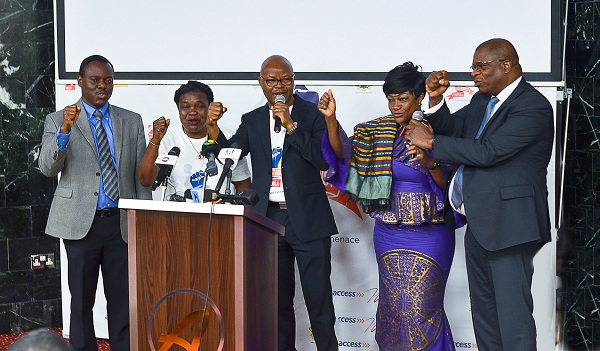Access Bank Ghana has launched an Obstetric Fistula campaign dubbed “Fist Against Fistula,” to help treat women and also create awareness about the condition among women in Ghana.
Launched by the Honourable Minister for Gender, Children & Social Protection, Madame Otiko Djaba, the campaign forms will see Access Bank provide free surgeries for One Hundred (100) women throughout the country, in partnership with Kaysens Gaisie Ltd, the Mercy Women’s Catholic Hospital, UNFPA as well as the Ministry of Health and Ministry of Gender, Children and Social Protection.
About two (2) million women are currently living with the Obstetric Fistula condition around the globe, the United Nations Population Fund (UNFPA) has indicated. Available statistics by the Ghana Health Service, 2016, indicates that over 1,300 Obstetric Fistula cases are recorded annually in Ghana.
Speaking at the launch, Managing Director of Access Bank, Mr. Ifeanyi Njoku explained that Access Bank embarked on this campaign because the statistics surrounding the disease in Ghana are very alarming. “As a leading bank in Africa, we would like to be a relevant stakeholder, an active partner and contributor in the fight against Obstetric Fistula to eradicate the condition not just in Ghana but in Africa.”
Mr. Njoku noted that despite a decade of the United Nations Population Fund’s (UNFPA) campaign to end Obstetric Fistula, the country is still overwhelmed with the condition. He called on Ghanaians to embrace the campaign to intensify public education to save women. “The alarming state of Obstetric Fistula disease in Ghana, requires the support of well-meaning Ghanaians and institutions in creating awareness to control the prevalence of the disease, as we intensify actions towards ending it”, he stated.
He further called on all stakeholders—Development Partners, Practitioners, Civil Society Organisations, Religious and Traditional Authorities, Customers of the bank and the general public—to join forces with Access Bank to end Obstetric Fistula in Ghana.
On her part, Honourable Otiko Djaba, commended Access Bank for launching this initiative that seeks to restore the dignity, happiness and hope of marginalised women.
“Obstetric fistula kills the hope of women, it kills the expectation of women” she said.
According to her, some traditional practices and beliefs including; Female Genital Mutilation, early and forced marriages and child birth, highly contributed to the incidence of obstetric fistula in the country.
The Gender Minister therefore challenged all citizens to play a role in helping women who are suffering from this illness.
In a speech read by Dr Ernest Aseidu, on behalf of the Minister of Health, stated that fistula was unique illness to women, hence the decision by the Ministry of Health to support Access Bank in order to help women live normal lives.
He noted that Government has outlined steps to curb the situation since the most effective way to prevent fistula was to increase access to quality maternal health care services, including family planning, skilled birth attendants and emergency obstetric care.
He explained that through this campaign, many women will be counselled while others will be given the necessary skill training to empower them after their surgery.
In attendance at the event were Honourable Minister for Gender, Children & Social Protection, Minister of Health, Managing Director of Access Bank, Representatives of United Nations Population Fund’s (UNFPA), Immediate past MD & a Non-Executive Director of the Bank among Others.
About Obstetric Fistula
Obstetric Fistula is a medical condition where a hole develops between the vagina, rectum and bladder as a result of prolonged or obstructed labour. The affected women leak urine or faeces or both through the birth canal which in the end often results in neglect and isolation of patients.
The fistula usually develops when a prolonged labour presses the unborn child so tightly in the birth canal that blood flows is cut off to the surrounding tissues, which necrotise and eventually rot away. More rarely, the injury can be caused by female genital cutting, poorly performed abortions, or pelvic fractures.
According to medical experts, other potential direct causes for the development of obstetric fistula are sexual abuse and rape, especially within conflict/post-conflict areas, other surgical trauma, gynecological cancers or other related radiotherapy treatment and, perhaps the most important, limited or no access to obstetrical care or emergency services.
Primary risk factors are early and/or closely-spaced pregnancies and lack of access to emergency obstetric care; a 1993 study in Nigeria found that 55 percent of the victims were under 19 years of age, and 94 percent gave birth at home or in poorly equipped local clinics. When available at all, cesarean sections and other medical interventions are usually not performed until after tissue damage has already been done.
Early marriage, domestic violence, female genital mutilation, malnutrition which is linked to under-development of the female body, and lack of education/illiteracy also put women at great risk for developing obstetric fistula. Personal knowledge, tradition and experience with childbirth may also put a woman at risk to developing obstetric fistula, especially for women who have previously experienced limited complications with past vaginal births.
Urinal and fecal leaking are the major physical side effects and because many women suffering from obstetric fistula do not want to leak, they will limit their intake of water and other liquids. This can lead to a very dangerous case of dehydration. Nerve damage to the legs is also noted as a medical side effect. In some cases, many women struggle to walk from this nerve damage and need physical therapy following the treatment of the fistula.















